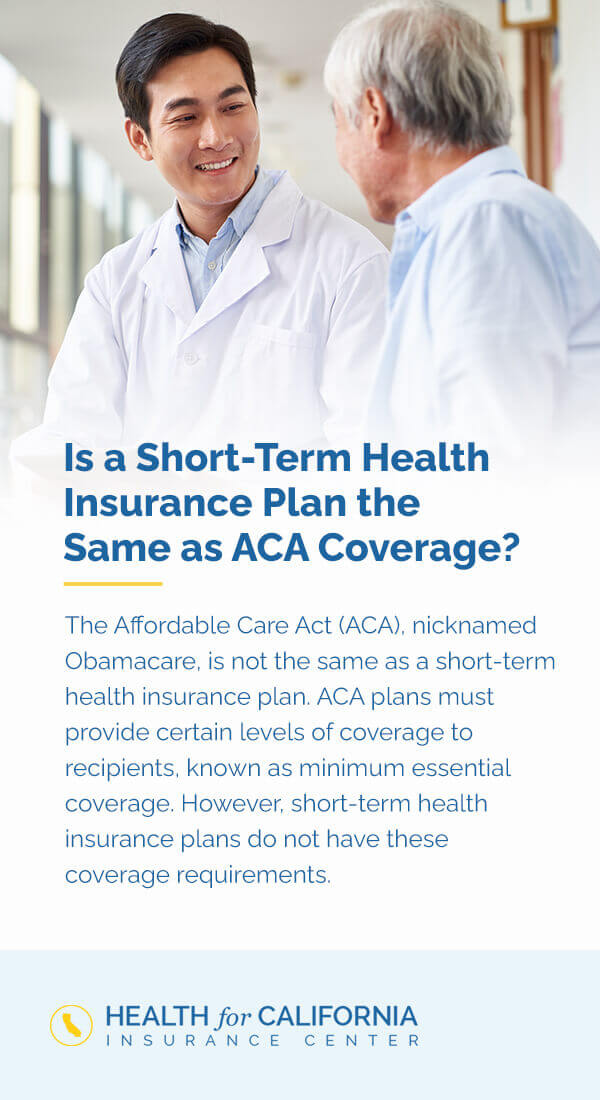What is short term health insurance?
Posted: December 14, 2022

If you’ve ever been without health insurance due to a life transition, such as a new job, you may have previously qualified for short-term health insurance coverage. This type of medical insurance policy, also known as an STM health plan, term insurance or temporary health insurance, was designed to help individuals save money on medical bills and avoid being uninsured.
Since 2019, short-term health insurance plans are no longer available for California residents. However, it’s still important to know how this type of temporary medical insurance works and its benefits so you can educate yourself and learn how it might compare to other plans that are available to you. In this guide, we’ll discuss the ins and outs of short-term health insurance and alternatives for this type of plan for California residents.
Short-Term Health Insurance

As the name suggests, short-term health insurance is a temporary health plan generally lasting for a few months to just under a year. Most plans start at around 30 days and have a maximum of 364 days per term. With these policies, in some states, individuals and families can sometimes renew these plans a few times in a row and potentially benefit from this coverage for up to 36 months. Short-term health plans are a flexible option for those who do not have health insurance through their employer, do not qualify for the Affordable Care Act (ACA) coverage, have financial limitations or are simply transitioning between jobs.
These plans are specifically designed for those who need quick health insurance at a relatively affordable price. For instance, someone in between permanent policies can use a short-term health insurance plan to bridge the gap and avoid being uninsured. People can also use this type of plan for major medical benefits in the event of unexpected illnesses or accidents. Temporary health insurance plans can even benefit people who are generally in good health and do not suffer from chronic illnesses.
When it comes to coverage, short-term health plans vary depending on the insurance company you buy from. However, most of these plans cover at least some of the following:
- Doctor visits
- Preventative care
- Hospital care
- Medical tests
- Physical therapy
- Surgery
- Urgent care
- Emergency care
- Prescriptions
Some short-term health plans will also offer cost savings for individuals who see in-network providers for their medical needs. Individuals may find short-term health plans an ideal option if they are:
- Looking for a less expensive health insurance plan
- Recently retired but too young to qualify for Medicare
- A college student or recent graduate
- Recently unemployed
- Waiting for ACA coverage to begin
- Returning from military duty
- A young adult who has aged out of their parent’s health plan
- Experiencing a waiting period before they can enroll in a major health plan
- Past the open enrollment date for other health plans
- A new employee waiting for group benefits to begin
- A part-time worker without employer benefits
Others may consider short-term health plans if they have certain upcoming health needs or want to protect themselves against emergency medical bills. Generally, short-term health plans have easy applications and no waiting periods for enrollment, so they can be an attractive option for people who do not have affordable access to permanent health insurance.
Is a Short-Term Health Insurance Plan the Same as ACA Coverage?

The Affordable Care Act (ACA), nicknamed Obamacare, is not the same as a short-term health insurance plan. ACA plans must provide certain levels of coverage to recipients, known as minimum essential coverage. However, short-term health insurance plans do not have these coverage requirements.
Compared to ACA health plans, short-term plans are simply meant to fill temporary gaps in coverage and provide limited benefits. ACA health insurance plans offer broader, long-term benefits like maternity, substance use and mental health treatment. While short-term health insurance plans are cheaper than ACA plans, short-term medical plans do not have a standardized set of benefits.
Additionally, ACA plans cannot deny individuals coverage for preexisting conditions or reject their application based on certain health problems. Conversely, short-term health plans can deny an application based on current and past health status. This means individuals can be denied coverage for a medical issue they’ve received treatment for in the past.
Advantages of Short-Term Health Insurance
Other than the fact that short-term medical insurance plans are convenient for many people during life transitions, there are several other benefits to temporary health plans. Perhaps the most attractive advantage is that short-term plans are often very cheap compared to plans that provide comprehensive coverage. For college students, young adults who have aged out of their parent’s health plan and people who are in between jobs, the affordability of a short-term plan often makes the most sense.
Short-term policies are also very flexible and vary in coverage. Some individuals may not want to pay for all the essential health benefits, particularly if they’re relatively young and healthy, so choosing a plan that only covers the type of care they think they might need can be an ideal solution.
Other benefits include:
- Individuals do not have to change doctors because short-term plans offer a broad network of providers.
- No open enrollment period restrictions — people can apply anytime during the year.
- Individuals are often notified within the same day if their application is approved.
- Many different short-term plans make choosing one that fits unique temporary needs easy.
- Limited waiting periods, so some individuals can often use coverage as early as the next day.
- Individuals can cancel coverage at any time without penalties.
Short-Term Health Insurance FAQs
Short-term medical insurance can be an ideal solution for many people. While this plan isn’t offered anymore in California, many other states do offer this type of health insurance, so it can be useful to understand them for your friends and loved ones in other locations.
Here are some popular FAQs consumers may have about short-term health plans.
1. Are Short-Term Health Insurance Plans Renewable?
As we mentioned above, whether a short-term plan is renewable depends on your state and plan of choice. Some plans may be renewable for up to 36 months. Other plans cannot be renewed automatically and require you to submit a new application or apply for another short-term insurance plan.
2. Are Short-Term Health Insurance Plans Available for Families?
Yes. Your spouse and dependents can be covered under a short-term insurance plan. However, all your family members must meet the medical requirements of the plan.
3. How Do I Use a Short-Term Health Plan?
If your short-term health insurance plan has a provider network, any doctor or provider within that network should accept your card, just as with permanent insurance policies. If your short-term health plan does not have a provider network, you may be able to see any provider you like. However, in this case, you may need to submit your medical bills to your health insurance company for reimbursement. Until your claim is reimbursed, you may need to defer payment with the doctor or set up a payment plan.
4. How Do I Cancel My Short-Term Coverage if I No Longer Need It?
When applying for short-term health coverage, you will typically have to determine how long you need the coverage to continue. After this period, your plan will cancel automatically if your insurance company does not offer renewals. However, if you need to cancel early, contact your insurance company or insurance agent and let them know to cancel your plan.
5. Can I Get a Tax Subsidy to Help Me Pay for My Short-Term Health Insurance?
No. Because short-term health insurance plans do not meet the minimum essential coverage requirements as defined by the ACA, they do not qualify for the same tax subsidies or cost assistance from the government that ACA health plans do. However, temporary health insurance plans typically cost much less than ACA health plans, so they may still be a more affordable option.
6. What Are My Cost-Saving Options With a Short-Term Health Plan?
When choosing a short-term health insurance policy, you can shop for a plan with fewer benefits or a higher deductible to save on costs. Once you enroll in this plan, staying in-network for your medical care could save you money. In some states, you may even be able to pay your entire premium upfront to save on expenses.
7. How Long Does Coverage Last?
Depending on your state and the policy you choose, you may be able to make month-to-month payments for your short-term health insurance plan up to the maximum term allowed by your insurance company or state. Your coverage will automatically terminate at the end of your term, or you can cancel it anytime.
8. How Much Does a Short-Term Health Insurance Plan Cost?
Short-term insurance plans come in many different plans and deductible choices to meet a wide range of needs and budgets. If you’re considering temporary health insurance, general upfront costs include the following:
- Premiums
- Deductibles
- Coinsurance
- Copays
- Other out-of-pocket expenses
Depending on the type of coverage you get, other costs may apply. Be sure to read all information in your health plan carefully before enrolling.
9. Should I Pay My Premium Monthly or Make a Single Payment Upfront?
Some short-term health insurance plans may allow you to pay for your temporary coverage in monthly installments or in a single upfront payment. Sometimes, the single payment option may be lower than the monthly plan costs. If you’re not sure which option to choose, consider the following:
- Monthly payments: We recommend you stick with month-to-month payments if you don’t have the funds to make a larger, single upfront payment or if you’re unsure how long you will need the medical coverage.
- Single payment: We recommend paying a single payment upfront if you want a lower plan cost, have the available funds to pay your whole premium or know exactly the length of time you will need the coverage.
If you choose the single upfront payment option, you will need to specify the duration of your health insurance coverage. With this option, you generally will not be able to get a refund if you need to cancel early.
10. Do Short-Term Health Plans Include Dental and Vision Coverage?
No. Short-term medical plans are generally meant to protect individuals and families in the event of an unexpected injury or illness and are not intended for dental and vision care. Because short-term plans are designed for temporary coverage only, they do not provide some of the benefits that long-term, standard health insurance plans offer.
11. Will Purchasing a Short-Term Health Plan Make It Harder for Me to Get Coverage in the Future for a Preexisting Condition?

No. Short-term medical plans are generally considered creditable coverage and prevent breaks in individual coverage. This temporary plan could make it easier to get coverage from an employer in the future and help satisfy any preexisting condition periods.
12. Is There a Tax Penalty for Not Having an Individual Health Insurance Plan?
There is no longer a penalty for being uninsured on a federal level. However, some states have their own penalties and mandates for health insurance coverage. California is one of these states, which means you need minimum essential coverage for yourself, your spouse and your dependents to avoid penalties. In California, the penalty for not having health coverage is known as the Individual Shared Responsibility Penalty.
This penalty is a flat amount determined by the number of people in the household or adjusted to the percentage of your household income. The penalty you pay for lack of coverage is whichever amount is higher of the two options. There are certain exemptions to this regulation, so be sure to determine if you qualify. Additionally, some health costs are eligible for tax deductions if your health insurance doesn’t cover all your medical bills.
13. What Else Do I Need to Know About Short-Term Health Insurance?
If you’re curious about enrolling in a short-term health insurance plan, keep in mind that you likely will not qualify if you have a preexisting condition, are over 65 years of age or need a long-term solution for you and your family.
Can You Enroll in Short-Term Health Insurance Plans in California?
Unfortunately, no. In 2019, California passed a bill to prohibit health insurance companies from issuing, selling, renewing or otherwise offering a short-term limited duration policy in the state. This was partly because lawmakers wanted to prevent health insurance companies from imposing any preexisting condition exclusions on health insurance coverage and expand overall health insurance options and affordability.
Because selling short-term plans is no longer lawful in California, short-term plans are not compliant with the requirements for minimum essential coverage in the state. Other states also prohibit short-term insurance plans.
How to Choose an Alternative to a Short-Term Health Plan
Individuals can obtain short-term plans through private insurance companies, though not all of them offer this type of plan. However, since these particular plans are no longer available in California, you need to know what alternative plans you may be eligible for. If you’re a California resident who is uninsured and shopping for insurance or insured but looking to make a switch, there are other avenues for finding the right health insurance plan for you and your family.
When shopping for an insurance plan, whether for yourself or your family, research and read all the details and guidelines before enrolling in any medical plan. Health insurance plans vary in cost and coverage. If you’re searching for short-term health plans, that likely means you’re seeking something more affordable with only the coverage you think you need.
At Health for California, you can find health insurance plans that meet a wide range of needs and budgets, including:
- Individual
- Family
- Small Business
- Senior Plans
- Travel Insurance
- Newborn
- Supplemental Health Plans
- Medi-Cal
Health for California also offers vision and dental insurance plans and affordable care, such as free preventative care and government discounts.
Find Your Health Plan With Health for California
Shopping for health insurance should be quick and easy. Though short-term health plans are no longer available in California, Health for California has many alternative plans for you to choose from that might fit your needs. Whether you need an individual plan, a self-employment option or something that covers the whole family, we have everything you need.
At Health for California, our goal is to help California residents find affordable medical insurance plans that suit their needs. Our easy application process means you can quickly enroll in a plan without all the hassle. Our agents have the expertise and knowledge to assist you in selecting the right California insurance plan and are ready to help. Reach out to us or request a quote today to begin filling out your no-obligation application.
